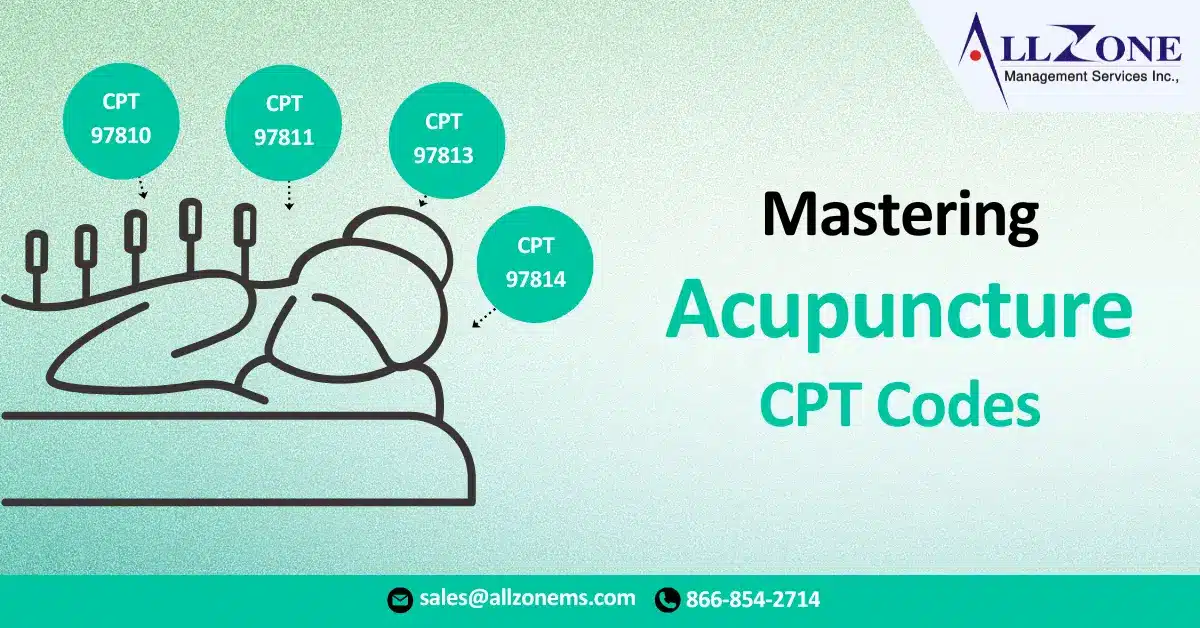As healthcare providers move into 2025, a technological revolution is reshaping revenue cycle management (RCM). Healthcare RCM with AI has emerged as a decisive factor in determining financial success or failure. With nearly 46% of hospitals and health systems already leveraging AI in their RCM operations, the industry faces a pivotal moment where keeping pace […]
Acupuncture is a time-honored practice that has gained recognition in modern healthcare systems worldwide. However, for acupuncture providers, navigating the intricate world of Current Procedural Terminology (CPT) codes can be challenging. Accurate coding of acupuncture CPT codes is essential for reimbursement, compliance, and seamless claim processing. This guide dives deep into the nuances of acupuncture […]
The U.S. Department of Health and Human Services (HHS) has issued a Notice of Proposed Rulemaking (NPRM) aimed at strengthening the HIPAA Security Rule. If finalized, these HIPAA Security Rule updates will significantly impact the healthcare sector. HHS has highlighted that healthcare breaches pose far greater risks than breaches in other industries. In announcing the […]
Diabetes mellitus is a multifaceted condition, and its Diabetes mellitus coding reflects that complexity. This article focuses on the role of medications in diabetes management and highlights the challenges coders face when assigning accurate codes for medication administration and related procedures. Why Is Diabetes Coding So Complex? Diabetes coding requires careful consideration of multiple factors, […]
Medical coding denials are a common challenge for healthcare providers and revenue cycle management (RCM) teams. They can disrupt cash flow, delay reimbursements, and increase administrative workloads. Avoiding these denials requires a proactive approach that addresses their root causes, ensures compliance with regulations, and fosters a culture of continuous improvement. In this blog, we’ll explore […]
We understand the importance of staying current with the ever-evolving landscape of healthcare coding. To help you navigate these changes, we’ve compiled a comprehensive resource library on our website featuring all our published HCPCS Level II code updates. Find the Latest Updates Here: HCPCS Level II Code Updates for April 2024 New HCPCS Level II […]
The arrival of the New Year brings excitement as people worldwide gear up to welcome 2025 with dazzling celebrations. For many, it’s a time for fireworks, dancing, and toasting to new beginnings. However, for healthcare providers, understanding the relevant ICD-10 codes for New Year is crucial, as treating patients remains uninterrupted, even during the holiday […]
During the hustle and bustle of the holiday season, it’s easy to get distracted by additional activities, leading to accidents and overlooking everyday safety practices that ensure our well-being. Unfortunately, such incidents can make physicians, emergency care, and urgent care providers busier during this time. Treatments for these injuries, often documented using ICD-10 codes for […]
December is synonymous with Christmas, a joyous holiday season perfect for decorating, savoring delicious treats, and gathering with loved ones. However, the festive celebrations also come with potential risks of injuries and illnesses, making it essential to familiarize yourself with Christmas ICD-10 codes for accurate diagnosis and treatment. Below are essential ICD-10 codes for the […]
End to end RCM (Revenue Cycle Management) encompasses every step in the healthcare payment process, from patient registration to final reimbursement. By adopting a comprehensive RCM approach, healthcare organizations can improve cash flow, minimize errors, and ensure compliance with ever-changing regulations. This blog will explore the components, benefits, and best practices for implementing an end […]










